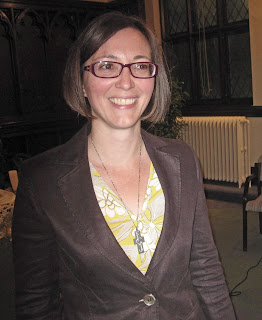The Gifts of Saying Yes to Living Poverty, Obedience and Chastity
Before taking my First Vows, I lived as an FCJ Novice in London, England for two years. The Novitiate program is meant to provide a contemplative space away from regular life so that those discerning a call to religious life can pray, study, and learn the practical side of what living the vows looks like in a religious community. It is also the place where the gifts of living this way of life begin to reveal themselves.
Within such a program, obedience has several facets. It means accounting for every dollar (or, in my case, British pound) that is spent. Novices’ days are often quite structured by the Director, and include scheduled prayer, spiritual reading, volunteerism and house chores. Through prayerful discernment, Novices are ‘missioned’ where their talents/skills are needed or where they will be necessarily challenged. During Novitiate, I volunteered in a soup kitchen, a seniors’ care home, a hospice and a safe house for trafficked women, to name a few.
Gradually, with prayer and the grace of God, this way of being starts to free us from our wish to try to control every aspect of our lives or have everything our own way. Our accountability to others deepens the awareness that we are all profoundly connected; we are, in fact, the ‘one body’ in Christ that St. Paul speaks of in Corinthians 12. We grow in our understanding that what we choose to do or not do impacts others’ lives, and that we are not answerable only to ourselves. Any ‘us’ and ‘them’ mentality starts to melt away and so others become more difficult to reject or overlook. We begin to comprehend the power of praying for others in a new way. We see each other with greater compassion and understanding. Put another way, we start to see the world as God sees it.
The FCJ Sisters do not practice a poverty of destitution as some congregations do. Most FCJs have worked as teachers and several have doctorates that they have used in the service of others. Some are artists who sell the paintings and cards that they create. All money that is not needed for their living expenses is used to support charities, schools and retreat centers in different parts of the world. FCJs practice their vow of poverty by signing away salaries, pensions and donations that they receive, and by living very simple lifestyles. They also commit themselves, in this vow, to using their every talent/skill for the good of others.
Living poverty graces us with many freedoms. We become less attached to stuff, and so it is easier to give away. We grow in our understanding of what we ‘need’, and so are less obsessed with gathering possessions. Because we are not accumulating so many things, we make room in our lives for God to shower with us with abundant gifts from the most unexpected people and situations. On another level, we grow in spiritual poverty: others’ opinions hold less sway over us. Insults and rudeness influence our own reactions less. Over time, poverty gives us the gift of desiring only what God desires- and what God desires for us can only lead us deeper into joy.
Living the vow of chastity is about learning to give our whole self to God. While many people often focus on sexual abstinence when discussing this vow, chastity is really about working to become a person who isn’t distracted by the things/ activities that sway us from deepening our relationship with God. It is a lifelong task to learn to disengage our attractions from those things that are not life-giving, but the benefits are breathtaking. When we can give more of our attention to God, we realize that God is found everywhere. A sunset, a delicious morsel of food, the scent of a rose, a person helping us in a moment of need: all can become profound moments of communion with God. The FCJs draw their spirituality from St. Ignatius, who taught that God can be found in all things, and so a life devoted to chastity will deepen our sense of this truth.
Chastity, poverty and obedience help us to get in touch with the terrifying and deeply freeing truths that nothing is really ours and that there is nothing we can control. The burden of accumulating things, people and accomplishments of all kinds is lifted. Pope Francis writes that people who have truly encountered Christ ‘find their lives filled with happiness’ and ‘are set free from selfishness’ (Evangelii Gaudium.) As we grow in the gifts of the evangelical counsels, we become ever more aware of the God who walks with us and works through us- a blessed and joyful space to be living, indeed.
Michelle Langlois, fcJ



micuXsump_do Adrian Viher https://wakelet.com/wake/fGgFZyivcZvKVpJFyAOdI
ReplyDeletealmeseari
riatellon_a Monica Castro Vysor
ReplyDeleteWinZip
Adobe Acrobat Pro DC
gloucanepan